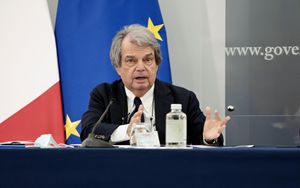(Finance) – “Politics has no margin for expansionary fiscal maneuvers in current spending. Let’s forget about it.” This is what I saidthe president of the CNEL Renato Brunetta in ahearing on Nadef in Parliament. The Pnrr – continued Brunetta – is instead “the only fixed point and solution, at least in the short term, that we have available. From the Pnrr we can recover all the possible growth, necessary for the stabilization of public finance balances. If we do not stabilize the public finance balances, the markets are ready to punish us.”
“Once the commitment has been made towards this direction of economic policy aimed at supporting reforms and investments in the coming years, nothing prevents the Government from finding the strength and time to proceed, already during the drafting of the Budget Law, with a further ‘cleaning’ the budget by starting a more accurate spending review. A review that starts from the mountain of deductions, deductions and bonuses generously granted in the past, and which – said Brunetta – cost the country every year around 120 billion euros. In any case, a review is necessary during 2024, if we want to create the necessary space for the tax reform planned by the Government, and for the strengthening of the social protection system which at the moment, due to the ongoing demographic dynamics, is too onerous both for the companies that for Italian workers compared to the European average, translating into a further compression of consumption and investments”.
There Nadef – explained the president of the CNEL – it arrives in a context of “absolute uncertainty and volatility due to the sum of two tragic, very serious elements, one lasting and the other whose potential is unknown. We are in the presence not only of uncertainty geopolitics and volatility linked to the war in Ukraine, a further element of uncertainty is given by the current Israeli-Palestinian conflict, which could produce even more unbalancing effects than the war in Ukraine, with energy imbalances far greater than those that we have already had to live. In this context, to the credit of the Government it must be recognized that the Nadef correctly takes into account in a prudential manner all the factors that have significantly worsened the public finance parameters compared to what was originally indicated in the DEF, and therefore tries to trace a path, evidently narrow, between the short-term support of workers and families most exposed to this negative economic situation, and financial stability”.
“The key point on the political agenda it must be aimed at guaranteeing interventions to support the growth of the country, which represents the only instrument through which to generate resources which can then be redistributed to the weakest families and workers. We therefore take note – highlighted Brunetta – that, in the given conditions, more is achieved in terms of growth and therefore support for the country’s social policies, investing in our agenda of reforms and investments, stabilizing market expectations and strengthening investor confidence with coherent industrial policy messages, and therefore, ultimately, reducing our public finance burdens by recovering resources for social policies. Furthermore, an assumption of responsibility in the direction of a policy clearly oriented towards supporting growth can also be a useful tool for creating consensus in the inevitable negotiation process that will follow with the European Commission. The latter will certainly appreciate the prudence on current spending and deficit balances, but cannot fail to notice the failure to reduce the debt/GDP ratio currently contained in the NADEF, and therefore a commitment in this sense appears appropriate”.
“Tax the banks’ extra profits – said Brunetta – it is not blasphemy when this increase in profits is due to a forced increase in rates in an anti-inflationary vein. I can only say that when faced with such events the policymaker has every right to intervene.”
“The proposal formulated by the social partners on the need for is also worthy of careful attention make the measure of cutting the tax wedge structural, in particular for the weakest groups of citizens and workers, which must however be reconciled with the stringent budget constraints that today, due to the changed economic framework, are being determined in public finance. CNEL – said Brunetta – is ready to do its part in this program. On the one hand, it is ready to host the National Productivity Committee, the technical body already operating in several countries and requested by Brussels, which has the task of analyzing all the actions linked to supporting productivity within a country to promote coordination. On the other hand, it continues to carry out its action as a ‘permanent forum’ for discussion and collaboration between social forces and institutional subjects, a dialogue that is all the more necessary in the era of profound changes we are experiencing, in order to contribute to the improvement of conditions of work in our country”.
